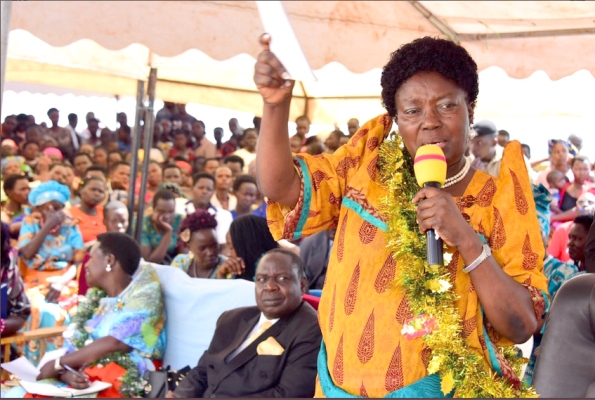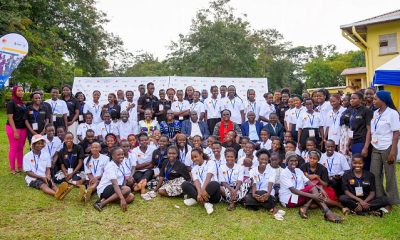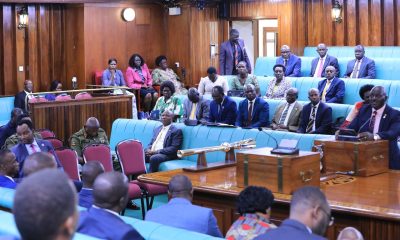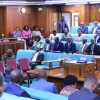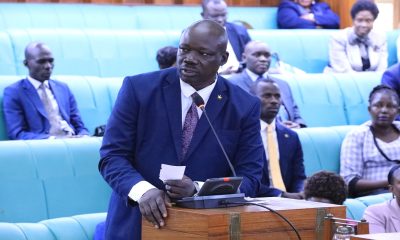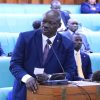Parliament
Kadaga reignites fight against FGM
Speaker Kadaga calls for concrete plan to reverse surge in FGM
The Speaker of Parliament Rebecca Kadaga is deeply disillusioned by the lack of action by the government to stamp out the banned practice of Female Genital Mutilation (FGM).
Speaker Kadaga highlighted the plight of girls suffering from the practice of forceful Female Genital Mutilation while delivering her Communication from the Chair at the opening of the current session of Parliament.
Her concern arose from her recent trip to Sebei sub-region as well as engagements with relevant stakeholders on the persisting vice of FGM.
Several reports indicate that FGM is on the rise in the district, even though it was banned by the government in 2010.
Delivering her communication from the chair at the start of plenary sitting of Parliament on January 22, 2019, Kadaga said FGM continues despite the existence of a law prohibiting the practice.
“Recently, I was in Bukwo and we learnt that there was an upsurge of FGM and no one could give an explanation,” said Kadaga.
In 2010, Parliament passed the Prohibition of Female Genital Mutilation Act, 2010 which prohibits and criminalises FGM, the offences, prosecution and punishment of offenders and the protection of victims as well as girls and women under threat of female genital mutilation.
Speaker Kadaga was concerned that despite the existence of the law, government has not carried out any campaigns against the practice, leaving it to Non-Governmental Organizations (NGOs).
“In 2009, the President launched a campaign against FGM in Amudat district. However, since then, I have not seen or heard of any government programme [against FGM],” said Kadaga.
While officiating at the 15th International Annual Christian Women Conference held at Kabei S.S.S, Bukwo district, Kadaga said that despite the progress in ending FGM in Uganda, the communities on the Kenyan side have not yielded to the plea to end the practice.
“I am told that when surgeons in Sebei lay down their knives, their counterparts in Kenya continue the practice and Ugandans go there,” said Kadaga.
At the same function, the Speaker called on the Minister for East African Community Affairs to coordinate with Kenya and develop joint anti FGM programmes targeting communities that border Sebei.
“Last Friday, I was with the Governor of West Pokot in Kenya and he expressed willingness to end this practice. Let the committee on EAC arrange meetings starting with West Pokot,” said Kadaga.
Lawrence Cherop Mangusho (NRM, Kween County) acknowledged there is an increase in cases of FGM in Sebei sub-region, which he said has majorly been recorded in Kween.
Mangusho claims that girls are forcibly circumcised, saying: “These girls organize themselves and forcefully go for circumcision.”
Reports of an escalation in cases of FGM have also triggered concern from other circles.
The Minister in-charge of General Duties in the Office of the Prime Minister, Mary Karooro Okurut said:
“This (FGM) is inhuman, it is unacceptable. It has been criminalized. I will present a plan of action from government,” said Karooro.
Committee tasked on implementation of FGM law
In a related event, the Parliamentary Committee on Education has been tasked to establish the progress made towards construction of schools in Sebei and Karamoja region to keep girls at school during the circumcision season.
The Speaker, Rebecca Kadaga, said when the Prohibition of Female Genital Mutilation Act, 2010 was enacted, it was agreed that government would construct model boarding schools to help educate the girls in Karamoja and Sebei regions.
“These schools were to be used to accommodate the girls during the season of circumcision. I know that the one in Amudat has not been built; the one in Nakapiririt was abandoned. I think the only one which is built is the one in Kosin in Sebei,” said Kadaga.
While delivering her communication during plenary sitting on Thursday, 24 January 2019, Kadaga directed the Committee on Education to visit all the areas where the schools were to be constructed and report to Parliament.
She tasked the Committee on Gender to find out the output of the UGX200 million which is allocated annually to the Ministry of Gender, Labour and Social Development for sensitization campaigns.
“We have been sending this money for the last seven years but I do not know if there is any output. The Committee on Gender should establish what this money is doing and the impact of the campaign,” said Kadaga.
The Speaker noted the need for government to fulfil its pledge to find alternative sources of livelihoods for the surgeons.
“Those surgeons get a lot of money during circumcision. If you circumcise 100 girls, you get UGX5 million. We had discussed that with the President but I think that has not been fulfilled,” said Kadaga.
But the Woman Member of Parliament for Amudat Rosemary Nauwat said the UGX200 million allocated for sensitization campaigns is insufficient.
“This money goes to Reach Programme based in Sebei and it is that same money which is to be used in all the districts where FGM is practiced. It is very little money,” said Nauwat.
She advised that the only guaranteed way to combat FGM is through promoting education so as to keep girls at school.
“The children who are going to school are not being circumcised. Government should take action to complete schools that were pledged and they should be boarding schools,” said Nauwat.
Jacquiline Amongin (NRM, Ngora) was also concerned that Uganda’s reputation as a country that is at the forefront of fighting FGM is being tarnished by the lapses.
“I am wondering if we are not losing the battle; we will be starting from zero and yet we have a law in place to combat FGM,” said Amongin.
Comments



